I'm a father of three from Sydney, a Product Director and a Product Coach. I write about product management and run the Product Manager community.
Subscribe to receive digest emails (1 per month).
-
A great product strategy doesn't just come from what you might build. It comes from being just as clear on what you won't.
There are two lists every product team needs. One is obvious: the wishlist. Features you'd love to build one day. The shiny ones. The creative experiments. The nice-to-haves that make you dream.
The other list? The never list. Just as powerful, even more clarifying. Features you'll never build. Because they break your strategy. Dilute your brand. Creep into someone else's territory. Or solve problems you deliberately chose not to solve.
This list sets your guardrails. It keeps sales from selling ghosts. And it makes every yes sharper - because every no is clear.
Focus doesn't come from chasing every idea. It comes from knowing which ones to kill. -
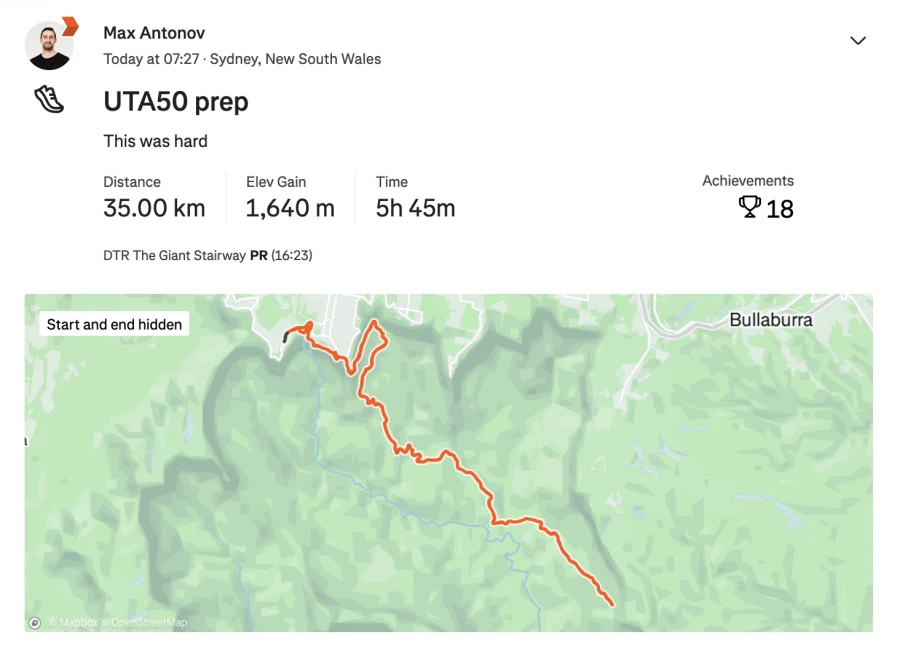
35km in the bank. But this one hurt.
Started fresh. Finished wrecked. 1,640m of elevation over 6 hours stripped me down. Legs gave out before the mind did - but only just.
UTA50 is another 15km longer, with almost 1,000m more elevation. Today's effort wasn't even the full thing. And it still broke me. If I hit that wall during the real race, I won't just slow down. I'll stop.
That's the scary bit.
But also the point.
The course doesn't lie. You either show up prepared or get chewed up. Today didn't break me. It just showed me where the cracks are. And that's exactly what prep is for.
Every painful step now is insurance for race day.

-
My wife and I watched Black Mirror S7E1 "Common People" last night. It felt less like fiction and more like a documentary. You could swap the brain implant with any early-stage product and the pattern is the same: from solving a problem to squeezing value.
You don't start out building dystopia.
You start with a dream.
To help someone. Maybe save a life.
Not growth. Not virality. Just impact.
It begins with something human.
“I want to help people.”
Real pain. Real need. Strong emotional pull.
So you build.
Scrappy MVPs.
Test empathy.
Pitch it as perspective-shifting. Maybe even healing.
Early adopters rave. Investors lean in. Retention climbs. Virality kicks.
So you optimise.
Empathy turns to entertainment.
Immersion becomes addiction.
Exploration turns into extraction.
“Total immersion” becomes your edge.
Richer data. Deeper sync. Sharper fidelity.
The product gets better. But better for who?
Then come the tiers.
Free. Plus. Premium. Ultra.
More access. More control. More fun.
Lower tiers don't get less.
They just get worse.
Ads. Friction. Withdrawal.
The customer's life becomes content.
Their pain becomes product.
Then the customer disappears.
No roadmap. No experience tracking. No consent.
Because they're not the customer.
They're the cost.
You're not evil. You're just in growth mode.
The sprint is full. The metrics are green.
Legal said yes. And besides - it's working.
Dystopia doesn't crash through the door.
It slips in quietly… while the dashboard stays green.
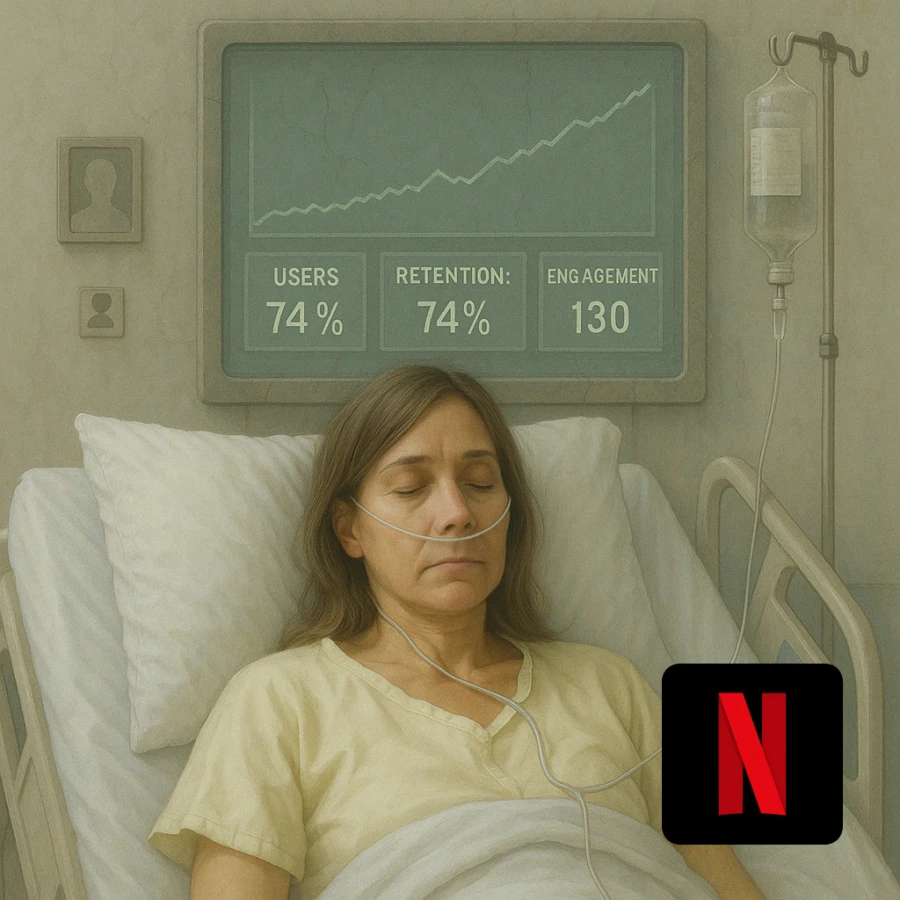
-
Hiring a Product Manager? Features don't tell you how they think. Trade-offs do.
“Design me a feature” is lazy. It rewards idea factories. It skips the messy bit. The hard decisions, the real trade-offs, the collaboration across disciplines. And most of the time, it's work for a designer, not a PM.
Great PMs don't need to be idea machines. They need to place good bets. People who know when to push, when to pause.
Want to spot a great PM? Ask about their past work. Zoom in on the messy bit. What changed because of them? What did they push for, protect or reshape? Where did they tilt the odds instead of following the script?
The best answers come from the hard parts - the tension and the feedback loops. The trade-offs and the moments when things weren't obvious. When the path wasn't clear but they still found a way forward. That's where the gold is. Not in ideas but in impact.
Real product work looks like wrestling with constraints, aligning the team, managing pressure and holding context across functions. It's pushing through ambiguity without defaulting to consensus. It's saying no more than yes. And it's knowing which bets matter and which don't.
PMs don't just ship features. They see through noise. They narrow scope. They frame decisions. Don't test them on what they can dream up. Test them on what they've already done. -
Calm is the flex.
Anyone can snap back. That's easy. A sharp reply, a passive-aggressive jab, a silent cold shoulder. But reacting lowers you.
Real strength isn't loud. It's poised. Collected.
Because when pressure hits and others lose their cool, staying calm does more than protect your dignity - it shows who's really in charge of themselves.
You don't need the last word. You don't need to win the argument.
So stay calm. Not to keep the peace. To keep your power. -
Verbal yeses mean nothing.
People hide behind them because there's no receipt. No audit trail. No follow-up. Just vibes. Verbal commitments are slippery by design - they give the illusion of agreement without the weight of action. They make it easy to nod, avoid conflict, and walk away uncommitted.
Written words change the game. They lock the conversation in place. A two-line follow-up after a chat becomes a timestamp. A shared truth. A trigger for action. Because once it's written, it's real. There's a name. A date. A decision. Suddenly, that “yes” carries weight. Accountability kicks in.
That's why some avoid writing things down. It removes the wiggle room. It kills plausible deniability. But if you're serious about progress - write it. Even if it's rough. Especially if it's uncomfortable. Written words drive the work. -
Stop hiring Product Managers to write tickets.
Start hiring them to shape the future.
Too many teams confuse product delivery with product leadership. They fill PM roles with people who keep the board clean, manage standups and translate features into tidy Jira tickets. It looks like progress. But all you've done is create a high-functioning to-do list. That's not product management. That's task management.
Real product managers don't just move work forward - they decide what work matters. They ask the harder questions:- What should we bet on?
- What problem are we solving?
- What's the outcome we're driving?
They think like GMs. They live in the tension between customer problems and commercial outcomes. They know the metrics. They sit in sales calls. They challenge assumptions. They protect focus. They say "no" more than they say "yes".
If all your PM is doing is cleaning up Jira, you don't need another one. You need a BA. Or maybe a project manager. But don't pretend it's product leadership.
Delivery is a muscle. Strategy is a brain. Stop building muscle at the cost of brains. -
The best CEOs are dual-lens operators.
Vision. Timing. Cash. They hold the big picture in their heads but stay anchored in the work. Product. Blockers. People. They see the nuance most miss. That mix is rare. The real limiter is processing power.
As companies scale, updates shift from chat to text. Verbal syncs don't scale. Reading does. Which is why CEOs must build teams who write clearly and asynchronously. Not optional.
Clarity equals speed. If your execs can't communicate in writing, you'll be stuck in meetings forever.
The CEO's leverage comes from how well the team writes. -
How to get better answers from your peers.
Instead of asking your peers to weigh in on different options and the best solution, just give them a solution. Stake a claim. Make it visible. Then let them shoot holes in it.
Framing it as “Here's my current thinking, based on the information I have today” does two things. It keeps you from sounding arrogant. And it opens the door for others to improve it. Feedback gets sharper. Responses come faster. The conversation shifts from “What should we do?” to “What's wrong with this?”
That's how you get to better answers...faster.
P.S. Not for every situation - just the ones where speed matters and your peers already trust you. -
Some execs get product-led growth wrong.
They confuse it for a team chart shift. Treat the product team like glorified BAs. Let sales keep owning the funnel.
But product-led growth isn't a structural tweak. It's a go-to-market motion. Product isn't there to “gather requirements” - it drives the entire engine. From first click to expansion. Sales doesn't disappear but it stops being the gate. It becomes a guide.
Leave product out of the funnel and you're not doing PLG. Putting lipstick on a sales funnel. -
Advisors don't build your product. Your team does.
Startups often chase external wisdom: big-name advisors, mentors or consultants. Feels smart. Feels strategic. But what gets ignored is the gold sitting right inside the company: the frontline team. The people closest to the work. The ones who spot real problems before they hit dashboards.
Most companies skip this step. They hire an advisor to fix product strategy, while the product team quietly shakes their heads. They run a culture workshop, while the team whispers: “We've been saying this for months”
The fix isn't more voices. It's better loops.
Build internal insight loops before you chase external ones. Create a rhythm of feedback, reflection and iteration...led by the people doing the work. Document the pain points. Invite challenge. Turn silence into signal. Once that's running strong, then (and only then) bring in outside help to sharpen, not replace, your instincts.
Your team knows more than your boardroom. Listen there first. -
Brilliance doesn't excuse bad behaviour.
Some leaders get away with everything. They shout. Interrupt. Get angry. Dismiss. Their results or tenure buy them silence. People tiptoe around them. Their tantrums get labelled “passion”. But under the surface, the team is hurting. The fear is real. Ideas shrink. Collaboration dies. Turnover spikes. The cost isn't loud. It's quiet...and compounding.
And here's the lie: “We need them”.
No, you don't.
You're just scared of the gap they'll leave. But that gap creates space for healthier leadership, for calmer thinking, for people who can deliver and respect others. High performance doesn't have to come wrapped in chaos. The best leaders know when to push, when to listen and when to shut up.
It's not enough to be brilliant. You have to be someone others want to follow.
Culture gets built by who you promote and protect. Letting toxic behaviour slide, just because someone's talented, tells the whole team one thing: this behaviour is ok. And that message spreads. Fast.
So stop making excuses for bullies. If they can't lead with discipline, they don't get to lead at all. -
Bad strategy documents aren't your fault.
You join a new team. You're handed a 30-pager full of buzzwords, abstract goals and empty phrases. You read it. You reread it. Still lost.
It feels like you're the problem. You're not. The document is.
Most strategy docs aren't written to be understood. They're written to impress. Or to tick a box. They sprawl with vague visions and empty frameworks, then expect alignment to magically follow.
But the job of a strategy isn't to sound smart.
📘 The job of a strategy is to create clarity. Direction. Focus. And what to ignore.
A good strategy is short and sharp. Like a pitch. You should be able to explain it in 30 seconds. Use SCQA if you need help: Situation, Complication, Question, Answer.
If you're a Product Manager, that's your job. Not just writing the doc. Shaping the strategy. Testing it. Pressure-proofing it with your team and execs.
So if you're staring at a bloated, broken strategy, don't wait for permission.
Tear it apart. Make it clearer. Make it tighter. Make it usable.
Alignment doesn't come from reading. It comes from understanding. -
This route is brutal but beautiful. Elevation like this breaks most runners. But it also builds something race day can't fake - grit.

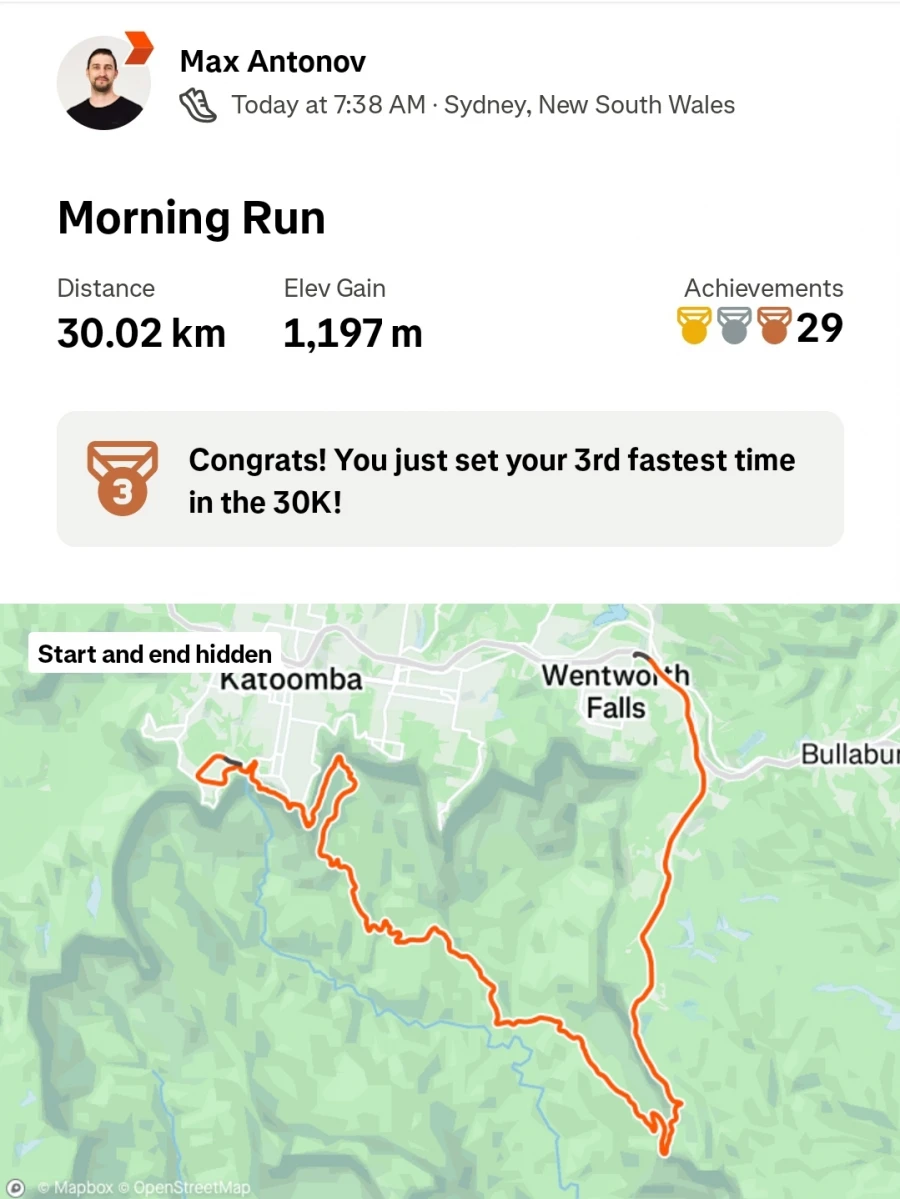
-
AI won't replace Product Managers. But it will expose the ones who never should've had the job.
PMs who survive on vibe, templates and Jira tickets are already being outpaced. AI does what they do. But faster, cheaper and with better spelling.
AI is forcing PMs to evolve from backlog babysitters into strategic operators.
No more hiding behind status updates or pretending roadmapping is vision. AI writes specs. It cleans up research notes. It summarises meetings and drafts Jira tickets before the devs have logged off. If that's your whole job, start sweating.
But if you're the kind of PM who shapes bets, sharpens focus and asks better questions -you're not replaceable. You're rare.
Only sharp PMs know which bets to place, when to double down and when to walk away.
AI won't take your job. But a better PM using AI will.

-
Product-market fit doesn't exist.
It's a myth we tell ourselves to feel like we're on the right track.
“Agile” suffered the same fate (at least there's the agile manifesto that exists). Started as a working philosophy, ended up a bingo word. Everyone says they have PMF. No one can show you where it lives. They just point to a vibe. Some traction. A few good months. A round that closed fast.
“We've got it!”
Based on what? Revenue spikes? Retention curves? Activation rates? NPS? Shorter sales cycles? Word of mouth? A gut feel after a good week? A bit of everything and nothing concrete?
The phrase has become a catch-all. Founders claim it when growth feels easier than usual. Investors expect it before writing a check. But there's no standard. No scoreboard. Every product is different. Every market reacts in its own way.
What looks like PMF for one company might be a dead end for another.
Product-market fit isn't something you find. It's something you feel.
And sometimes, you just hope you're right. -
Feedback delayed is feedback diluted.
After two weeks, the lesson goes cold. Details fade. Emotions disappear. What could've been a clear moment becomes a blur.
You try to explain what went wrong. Or what went right. But the context's gone. The person nods but doesn't feel it. They can't replay the moment in their head. The energy's moved on.
Feedback works when it's fast.
“In that meeting just now…” hits different than “Remember that thing two weeks ago?” One feels sharp. The other feels vague. Fresh feedback still has signal in it. Wait too long, and all you're left with is noise.
Don't hold it back. Say “great job” when the win is fresh.
If something was worth noticing, it's worth saying. Right now. Say it while the moment's still alive. -
That gut feeling - that AI-generated art doesn't feel like yours - comes from a shift in how we define creativity, not a lack of it. But creativity has never been about tools.
Photographers don't build lenses. Filmmakers don't engineer cameras. Designers don't invent Figma. Yet no one questions whether their work is “theirs.” Because their fingerprints are all over it - what they chose to include, exclude, highlight, or distort. Intent is the signature.
AI doesn't change that. The interface got smarter. You're choosing the vibe, the story, the style, the framing. That's direction. That's creation.
If anything, AI just exposed how addicted we were to the romantic struggle of the process. But real creative work is about judgment, not just labour. You made the call. You made the thing.
It's yours.
Or is it? -
Yeah, everyone's talking about ChatGPT image generation online - and I get it. It's addictive and pretty entertaining.
One of the cooler ways to use it is by turning a rough sketch into something way more polished.
Here's one of my early, messy drawings I made for the “Cultivate and Cut” post. I always meant to come back and clean it up but never got around to it. So I asked ChatGPT to turn it into an illustration - and honestly, the quality blew me away.
Here's my (ugly) original drawing:
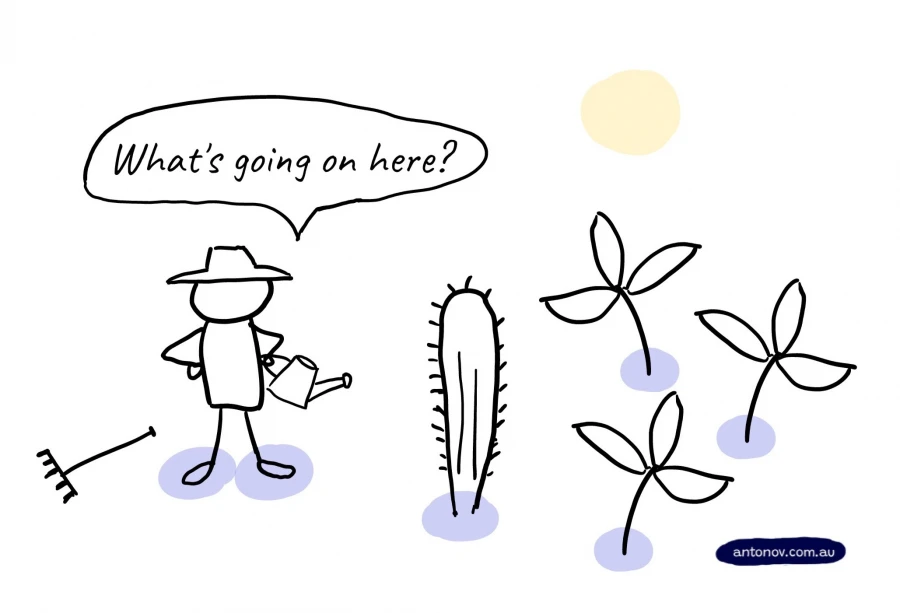
Then I asked for an illustration version:

Next, I asked it to add some extra details:

Then I tried an isometric version:

Then photorealistic:

And finally, a Ghibli-style version:
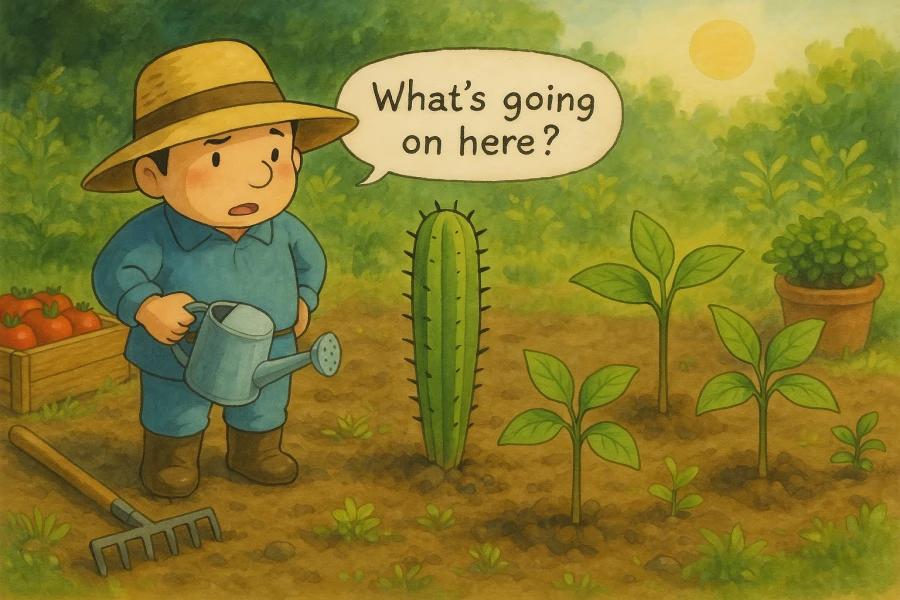
I'm definitely going to keep playing around with turning my sketchy concepts into full illustrations. This is just too much fun. -
A morning run. Half-marathon with over 700 m of elevation. Three hours on the legs.
That's not just training - that's mental conditioning. This was another brick in the UTA50 wall. Quiet work. Honest effort. A long session that burns the calves and builds the mindset.
Pace doesn't matter when the elevation looks like a mountain range. What matters is showing up. What matters is stacking these efforts week after week.
You don't finish UTA50 on race day. You finish it here. In the sweat. In the silence. In the rain. In the Sunday slogs when no one's watching.
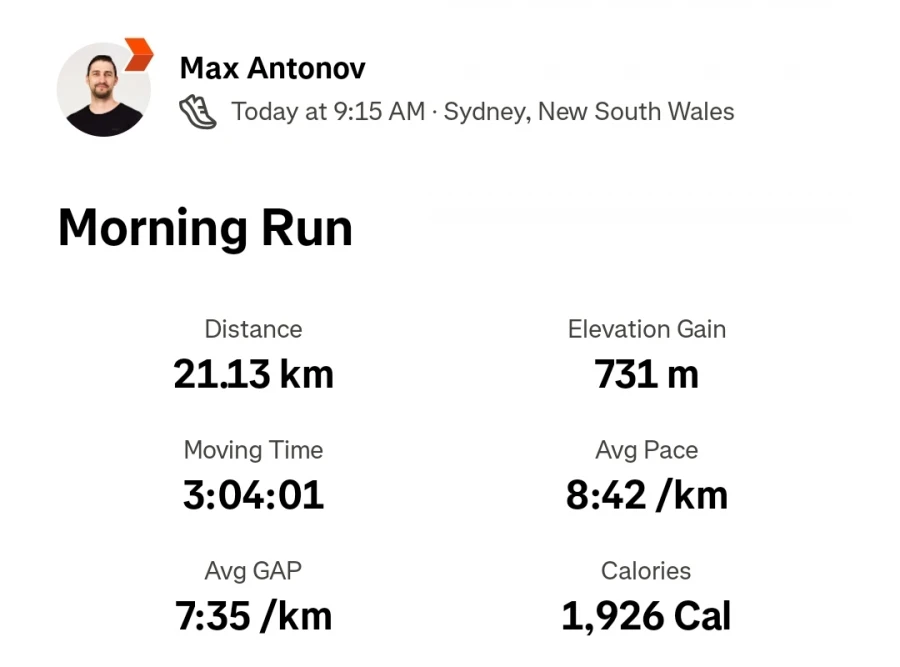
Feel free to reach out: [email protected].
